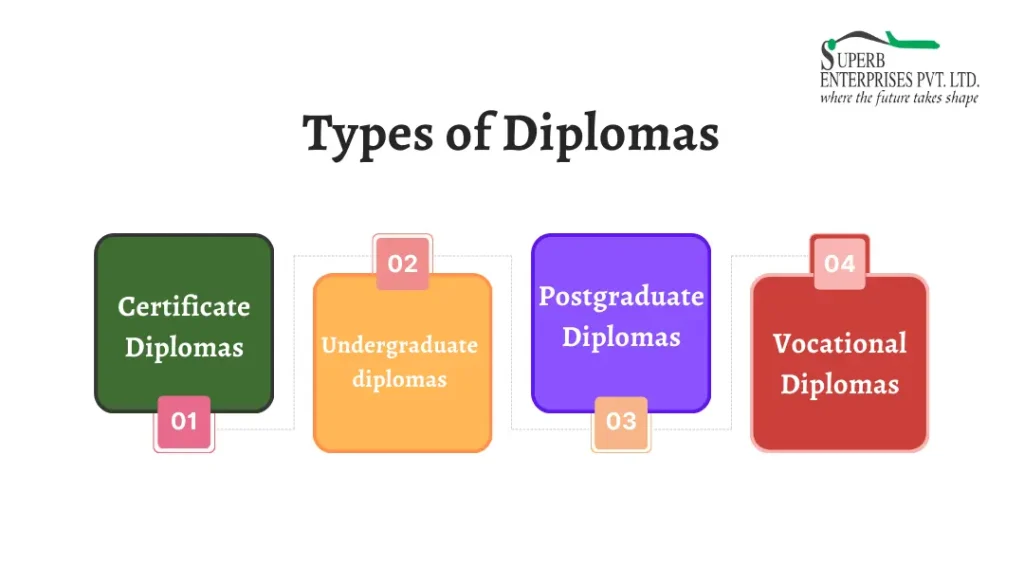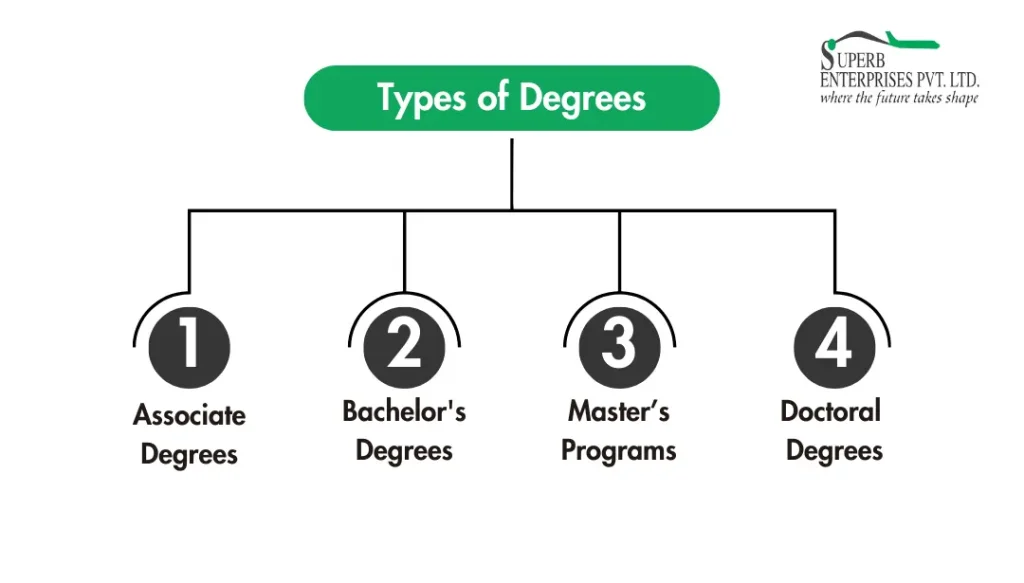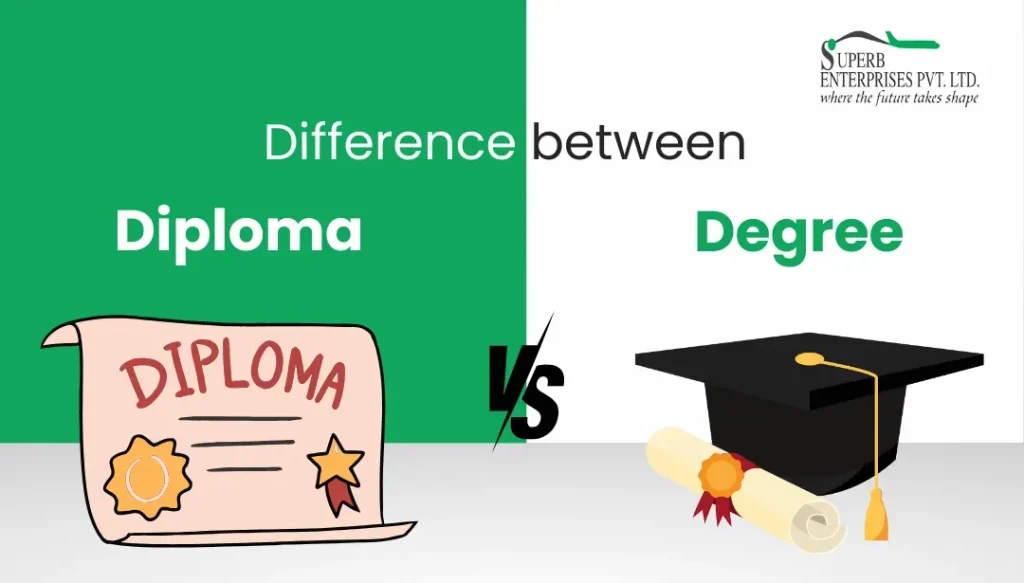In India, many people don’t even know the difference between a diploma and a degree which makes it difficult for them to choose which one is better for them
Choosing between a diploma and a degree sometimes requires some difficult decision-making, almost feeling as if you are standing at a crossroads where each route leads to alternative opportunities and challenges.
While both are powerful tools that can shape your career, they cater to different aspirations, skills, and industries and knowing the difference between the two could help you unlock your dream job.
In this blog, we will talk about what is the difference between diploma and degree to help you choose the best option for you. Without any further delays, let’s dive right into it!
What is the Difference Between a Diploma and a Degree
Before knowing the difference between a Diploma and a Degree, let first know a few things about a Diploma and a Degree
What is a Diploma?
A diploma is a short course designed to equip practical skills and knowledge for a specific profession or industry. A diploma focuses more on hands-on training and real-world applications, unlike a degree which is focused more on theoretical knowledge.
A diploma provided by a university, college, or vocational institution enables students to enter the workforce quickly. It is ideal for individuals wishing to develop specific skills in a much shorter span.
A diploma may also refer to the completion of an educational program. However, in this case, we strictly refer to the short-term technical courses individuals undertake to join the workforce quickly.
Types of Diplomas

Diplomas come in various forms, catering to different individual needs and career paths. Some of the most popular types of diplomas are as follows:
- Certificate Diplomas – Short courses that enhance specific skills or qualifications.
- Undergraduate diplomas – Courses that are offered to high school graduates usually completed in one to two years.
- Postgraduate Diplomas – Advanced courses targeted at students holding a degree for further specialisation.
- Vocational Diplomas – This deals with specialised courses in say plumbing, carpentry, cooking, etc.
Benefits of a Diploma
A diploma is a very useful achievement that helps students in many different ways including advancing their careers. Listed below are some of the most popular benefits of a diploma;
- A diploma emphasises industry-related skills, preparing the students for work immediately after college.
- Diploma courses also often have flexible timings, allowing students to combine work and study.
- They come in handy when one needs a career change or a leap for further education.
- Access to the job market through diplomas is fast and affordable.
Eligibility Criteria of a Diploma
Eligibility for a diploma varies according to the type of diploma one wants to pursue and it also depends on the institution from where one wants to acquire a diploma.
In general, a high school certificate or equivalent is required for undergraduate diplomas, while a bachelor’s degree is needed for postgraduate diplomas.
However, some vocational diplomas need no formal prerequisites but conduct an assessment based on certain skills or experiences.
Popular Fields Offering Diplomas
Diploma programs are a popular choice for students looking to fast-track their way to employment or learn a valuable skill. Multiple diploma programs are offered across diverse industries. The most popular ones are;
- Healthcare – Nursing assistants, medical coding, pharmacy technicians.
- Technology – IT support, web development, software testing, computer engineering, data science, etc.
- Business – Office administration, digital marketing and accounting.
- Creative Arts – Graphic design, photography, fashion design, Animation and multimedia, Fashion designing, etc.
How to Apply for a Diploma Program?
The application procedure to secure admission to a diploma program is pretty straightforward. Following are the steps to be followed;
- Start by researching institutions offering the course you’re interested in.
- Check their eligibility criteria, fees, and deadlines.
- Prepare necessary documents such as academic transcripts, ID proof, and recommendation letters if required.
- Submit your application online or in person and track its progress to secure admission.
What is a Degree?
A degree is an academic qualification offered by universities, with a focus on theoretical knowledge and critical thinking as opposed to the practical knowledge offered in diploma courses.
A degree means an all-round education in a subject area including some practical aspects. Many students, while pursuing their degrees, get research and internship opportunities.
Degrees are long-term commitments, laying the foundations for career growth and advanced studies.
Types of Degrees

Degrees are classified into several levels depending on academic progression:
- Associate Degrees – Short programs that provide foundational knowledge. This type of degree usually takes two years to complete.
- Bachelor’s Degrees – Full-time undergraduate courses taking 3–4 years to complete.
- Masters’ Programs – Postgraduate courses specialised in further enhancing knowledge. Typically takes two years to complete.
- Doctoral Degrees – These are research-intensive programs that lead to expertise in a field.
Benefits of a Degree
Completion of a degree involves in-depth theoretical study of a particular subject/field. A degree certificate undoubtedly comes with various benefits for the student. Some of the popular benefits include;
- It gives one a wide range of knowledge and skills to the student.
- Degree holders have better career prospects leading to an improved professional life.
- Degree improves reasoning, analytical capabilities, and leadership skills.
- Most degrees lay down avenues for higher salaries, promotions, and career advancement.
- In most industries, degrees are also a requirement for senior-level appointments.
- A degree also provides individuals with specialised knowledge
Eligibility Criteria for Degrees
The eligibility of a student for degrees depends completely on the type of degree and the institution from which they wish to study. However, certain criteria remain the same throughout the spectrum.
To be eligible for an undergraduate degree, one requires a high school diploma. Postgraduate degrees typically require successful completion of a bachelor’s degree in a relevant field, while additional entrance exams or specific GPAs are subject to institution and program requirements.
Popular Fields of Study for Degrees
Numerous institutions offer degrees in almost all fields of study ranging from business and healthcare to engineering and arts. Some of the most popular fields of study for degrees are as follows;
STEM (Science, Technology, Engineering, and Mathematics) – Computer science, biotechnology, and all other types of engineering.
Business and Economics – Marketing, Finance, Business administration and entrepreneurship.
Humanities – Literature, Psychology, History, Journalism, Communication, etc.
Health Sciences – Medicine, physiotherapy, Nursing and Public Health.
How to Choose the Right Degree?
Your choice of a degree should be based on your career ambitions, interests, and academic strengths. You can research the available career opportunities and job market trends within your selected area of study to help you make the right decision.
You can also ask academic advisors, professionals, or alumni about their experiences and suggestions. Another important point to be taken into consideration is the program length, tuition costs, and reputation of the university into consideration.
Difference Between Diploma and Degree
Understanding the difference between a degree and a diploma is immensely important when considering higher education. Both are valuable options, but very different in terms of function, duration, and scope.
Let’s explore some key differences to help you make an informed choice.
The short difference in the table
| Aspect | Diploma | Degree |
|---|---|---|
| Duration | A few months to 2 years. | 3-4 years (Undergrad), 1-2 years (Postgrad). |
| Eligibility | After 10th or 12th grade. | Requires 12th grade completion. |
| Career Opportunities | Entry-level, vocational jobs. | Higher-level, professional roles. |
| Focus | Practical, skills-based learning. | Theoretical, research-based learning. |
| Recognition | Recognized for specific skills. | More internationally recognized. |
| Cost | More affordable. | More expensive. |
| Admission | Simple, based on basic qualifications. | Competitive exams and marks criteria. |
| Job Market | Valued for hands-on skills. | Preferred for managerial roles. |
| Flexibility | Flexible (part-time, online options). | Less flexible, full-time commitment. |
| Practical Experience | Strong hands-on training. | Includes internships, and more theory. |
Long Explanation
Duration
- Diploma – It is comparatively quite shorter, lasting anywhere between a few months to 2 years, depending on the course.
- Degree – It usually takes students 3–4 years to complete an undergraduate degree program and 1–2 years to undertake postgraduate studies.
Eligibility
- Diploma – Students having completed the 10th and 12th grades successfully are eligible for diploma programs.
- Degree – Completion of higher secondary education also known as 12th grade is compulsorily required for an undergraduate degree.
Career Opportunities
- Diploma – Offers entry-level opportunities in certain industries, specialising in technical or vocational areas.
- Degree – Offers entry into a wider and better position in the professional and managerial fields. It is often a requirement for top-level jobs in an institution.
Educational Focus
- Diploma – A “practical and skills-based” learning approach that would apply in the workplace immediately.
- Degree – Focuses on theoretical, research, and deep knowledge of a subject.
Recognition and Credibility
- Diploma – Recognised for specific skills but may not have the same universal credibility as a degree.
- Degree – More internationally known and has greater acceptance in the professional and academic spheres.
Cost
- Diploma – It is a more economical option making it a popular choice for quick skills acquisition.
- Degree – A degree course is comparatively always costlier. Degrees are longer and very detailed so naturally they cost more when compared to diploma programs.
Admission Requirements
- Diploma – Usually has simpler admission procedures, focusing on minimum academic qualifications.
- Degree – Typically consists of entrance examinations and a competition for places. Depending on the institution, students might even need to meet minimum marks criteria to be eligible for admission.
Job Market Perception
- Diploma – Considered to be practical and efficient, which is valued in industries requiring precise skills.
- Degree – It is prestigious and often preferred by employers for high-ranking roles.
Flexibility
- Degree – Not much flexibility as it involves a full-time commitment for several years.
- Diploma – Extremely flexible. It is available both for part-time and online learning modes.
Practical Experience
- Diploma – Strongly emphasizes hands-on training and experience, preparing students for immediate employment.
- Degree – Contains internships, but is mainly a degree course to engross intellectual knowledge.
Understanding the differences between a diploma program and a degree course would ensure that individuals choose the pathway that best aligns with their career goals and personal circumstances.
Differences in Degrees and Diploma Attestation
| Criteria | Diploma | Degree |
| Purpose | Required for vocation, skill-based, or junior-level work. | Needed for higher education outside the country, professional work, immigration, or skill-based employment. |
| Authorities Involved | Similar authorities are involved. However, HRD’s role is commonly bypassed if the diploma is issued by a private institute. | University or Board of Examination. HRD/Regional Authentication. Ministry of External Affairs. Embassy of the destination country. |
| Documents Needed | Original diploma certificate Academic records (if requested) Passport CopyInstitutional verification letters (if applicable) | Original degree certificate Academic transcripts Passport copyAuthorisation letters (if applicable) |
| Countries Needing Attestation | They are usually needed in GCC countries (UAE, Qatar, Saudi Arabia, Oman, etc.) and other Asian or African nations for skill-based roles. | It is required globally, especially in countries like UAE, Saudi Arabia, Qatar, USA, UK, Canada, and Australia, for skilled professional work or higher studies. |
| Cost | Generally, diploma attestation costs less than degree attestation. | The attestation cost varies depending on the degree type and the destination country. |
How can we help you in Attestation?
Candidates looking to move abroad for higher education, skill-based employment, or immigration need to get their diploma and degree certificate attested by the concerned authorities so the said documents can be accepted as legal and valid in the destination country.
You can approach Superb Enterprises for all your diploma and degree attestation needs. We are an MEA-authorised agency with over a decade of experience in the industry providing a seamless attestation service at the best prices.
Frequently Asked Questions
- Is a diploma less valuable than a degree?
A diploma can be comparatively less valuable than a degree in terms of job and professional growth opportunities it provides. However, in no way diploma is a lesser option especially if you aim to join the workforce quickly.
- How long does it take to complete a diploma versus a degree?
Diploma programs can range anywhere from a few months to two years, whereas an undergraduate degree takes up to 3-4 years to be completed.
- Can I pursue a degree after completing a diploma?
Yes, you can pursue a degree after you complete your diploma. Many students undertake polytechnic diplomas and then go on to enrol in undergraduate courses like B. Tech or BE.
- What kind of jobs can I get with a diploma?
A diploma can lead to jobs in health care, IT, business and creative industries as a medical assistant, a web developer, or even a graphic designer. A diploma prepares you for entry to mid-level opportunities.
- Which one is more expensive: a diploma or a degree?
A degree is generally more expensive due to its longer duration and a wider curriculum. A degree is also a more popular choice amongst students as it opens wider career avenues.
